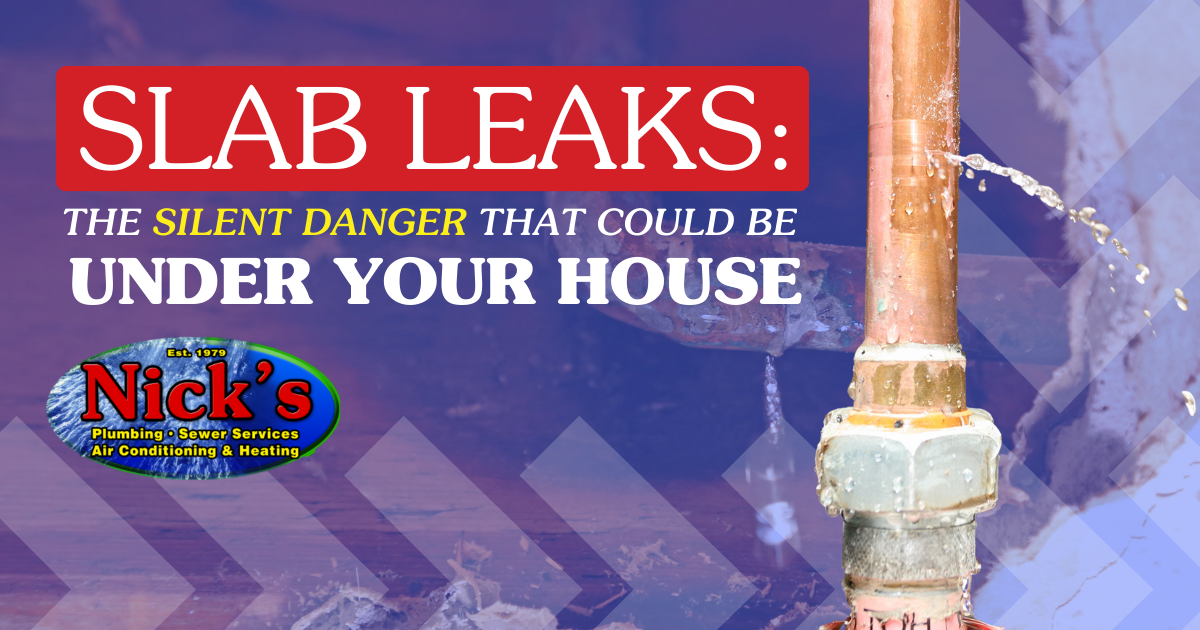Most Houston homeowners are familiar with the headaches of clogged drains, leaking faucets, or a busted water heater. But one of the most serious plumbing problems is also one of the hardest to spot: the slab leak. Hidden under the very foundation of your home, a slab leak can quietly cause structural damage, drive up your water bills, and even create health risks from mold and mildew.
What Is a Slab Leak and Why Is It So Dangerous?
In simple terms, it’s when a water or sewer pipe that runs beneath your home’s concrete foundation starts to leak. Since these pipes are buried under several inches of concrete and soil, the problem isn’t likely to be visible right away.
The danger comes from time. Water leaking beneath a slab has nowhere to go but into the soil supporting your home. Over weeks or months, it can weaken the ground under your foundation, leading to cracks, sinking, or uneven floors. And because many of Houston’s homes, primarily inside of or close to the 610 Loop, often sit on clay-heavy soil that already shifts continuously between wet and dry weather spells, slab leaks are more likely to occur and create instability for your home.
Key takeaways:
- Hidden location: Slab leaks happen under your home’s concrete foundation, making them hard to detect.
- Structural risk: Leaking water erodes soil and can undermine the stability of your foundation.
- Long-term damage: The longer it goes unnoticed, the worse—and more expensive—the repairs become.
How to Tell If You Have a Slab Leak
Since you can’t see under your foundation, you have to rely on indirect signs. Homeowners often discover a slab leak only after noticing something unusual with their floors, bills, or water pressure.
Common Signs of a Slab Leak:
High Water Bills: If your usage hasn’t changed but your bill suddenly jumps, that’s usually water leaking somewhere you can’t see.
Wet or Warm Spots: You might feel a warm patch on tile or notice carpet that never seems to dry — both are red flags for a hidden leak.
Musty Odors or Mold: That damp, earthy smell on the ground floor is often the first clue that moisture is trapped under the slab.
Cracks in the Foundation: Small cracks are common in any home, but if you notice new ones after the slab has settled, it could indicate that the soil underneath is shifting due to a leak.
Running Water Sound: You may hear the sound of running water when no fixtures are in use.
Cracked Tiles: Water pressure can cause tiles and grout to crack or loosen.
Early vs. Advanced Signs
At first, the only clue may be a higher water bill or a faint sound of water. As the leak progresses, the signs become harder to miss: cracks in walls or flooring, uneven doors and windows, or visible water pooling indoors. By the time you see structural issues, the slab leak has likely been there for months.
What Causes Slab Leaks in Houston Homes?
Houston homes are especially vulnerable to slab leaks thanks to our soil and climate conditions.
- Expansive clay soil: Houston’s soil swells dramatically when wet and shrinks during dry spells, putting constant stress on both foundations and pipes.
- Corroding pipes: Older copper or cast-iron pipes can deteriorate from hard water minerals or chlorine in the city supply.
- Abrasion and vibration: As water flows, pipes can rub against rocks, rebar, or the slab itself, wearing them down.
- High water pressure: Excess pressure accelerates wear and increases the risk of sudden leaks.
- Poor installation: Pipes damaged or improperly placed during construction are more likely to fail over time.
How Plumbers Detect a Slab Leak Without Tearing Up Your Slab
Say “slab leak” and most folks picture the worst — a plumber standing in your living room, jackhammer in hand, about to make a mess. The good news is that modern leak detection doesn’t usually look like that. These days, plumbers in Houston have a whole toolbox of gadgets that can sniff out a hidden leak without tearing the place apart.
Licensed slab leak plumbers in Houston rely on specialized gear to track down leaks that can’t be seen. Sometimes it’s as simple as using sensitive microphones that pick up the faint hiss of water escaping underground. Other times, thermal cameras spot warm patches from hot-water lines, or moisture meters confirm that hidden dampness is creeping up through flooring or walls.
The big advantage? With this kind of technology, plumbers can zero in on the exact trouble spot. That means less guessing, less demolition, and a repair that targets the leak instead of tearing up half the house.
Can Slab Leaks Be Repaired Without Breaking the Slab?
Yes, in many cases. While sometimes the only option is breaking through the foundation directly above the leak, other repair methods can spare your floors.
- Tunneling: Plumbers dig a tunnel under the home from outside to reach the damaged pipe. This avoids disrupting the flooring inside.
- Pipe rerouting: Instead of fixing the damaged pipe, plumbers bypass it by running a new line through the walls or the attic.
- Epoxy pipe lining: A trenchless option where an epoxy coating is applied inside the existing pipe to seal leaks.
Which option works best depends on the pipe’s location, the home’s age, and the overall condition of the existing plumbing.
How Much Does It Cost to Repair a Slab Leak in Texas?
The cost can vary widely. A simple spot repair through the slab may be less expensive upfront, but it is much more disruptive. Tunneling or rerouting will probably cost more in labor, but it may protect your interior finishes, like floors and walls. On average, Houston homeowners can expect slab leak repair to range anywhere from a few thousand dollars for minor work to significantly more if extensive tunneling or repiping is required.
Does My Homeowners Insurance Cover a Slab Leak Repair?
Insurance coverage can be tricky. Most policies will cover the damage caused by a slab leak, such as ruined flooring or foundation cracks, if the event is considered “sudden and accidental.” But the actual repair of the pipe itself is often not included.
That means your policy might pay for fixing the damage to your home, but you’ll still need to cover the cost of the plumbing repair yourself. Because every policy is different, it’s smart to call both a plumber and your insurance company right away should you suspect a slab leak.
Can a Slab Leak Cause Foundation Problems?
Absolutely. A continuous leak undermines the soil that supports your home. Over time, this can cause the foundation to settle unevenly, leading to cracks, warped floors, or even doors and windows that won’t close properly. In Houston, where clay soil already makes foundations vulnerable, a slab leak accelerates the damage dramatically.
Can Slab Leaks Be Prevented?
Sadly, there is no magic fix in our toolkit that can guarantee you’ll never have to worry about a water leak beneath your foundation, but there are a couple of things you can do to perhaps swing the odds in your favor.
One of the most effective protective measure is to keep your water pressure in check. A pressure regulator installed at the meter will help to take the stress off your pipes, which translates to fewer chances for a line to burst.
Getting a plumbing inspection once a year is one of those simple habits that pays off. A licensed plumber can spot the little things — a bit of corrosion here, a pipe that’s shifting there — long before they turn into the kind of repair that wrecks your weekend and your budget.
Just as important is keeping your eyes and ears open around the house. If your water bill suddenly increases for no reason, you catch a persistent musty odor, or you hear a faint hiss even when everything’s turned off, don’t dismiss these signs. Those slight hints are often your first warning, and catching them early is always cheaper than waiting until they blow up into something bigger.
Why You Shouldn’t Wait to Fix a Slab Leak
Slab leaks aren’t the kind of problem that fixes itself if you give it time. Even a small leak can slowly wash away the soil under your foundation or keep enough moisture trapped to feed mold. The longer you let it go, the worse it gets — and the higher the bill climbs when you finally deal with it.
Catching it early usually means a straightforward repair. Waiting turns it into foundation cracks, warped floors, and the kind of damage that can snowball into a full-blown crisis. When it comes to slab leaks, “later” almost always equals “more expensive.”
Why Choose Nick’s for Slab Leak Detection and Repair in Houston?
Slab leak plumbing requires specialized tools, expertise, and local knowledge. Nick’s Plumbing has decades of experience helping Houston homeowners with slab leak detection and repair. Our licensed slab leak plumbers know how to work with the city’s shifting soil, aging plumbing systems, and unique climate challenges. We focus on finding the least disruptive, most effective repair option for your home.
FAQ – Slab Leaks in Texas Homes
Can a slab leak cause my water bill to go up suddenly?
Yes. Unexplained spikes in usage are often the first sign of a hidden leak.
Can a slab leak cause mold or mildew problems in my home?
Definitely, moisture trapped under flooring creates the perfect environment for mold, which can spread indoors.
How long can a slab leak go undetected before it causes severe damage?
Months—or even longer. That’s why early slab leak detection is so critical.


























